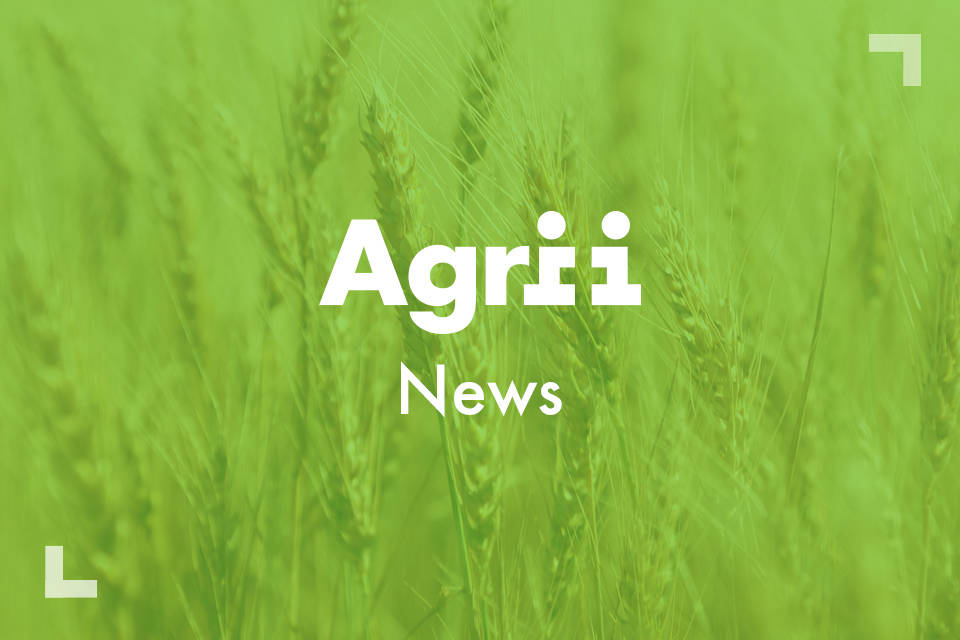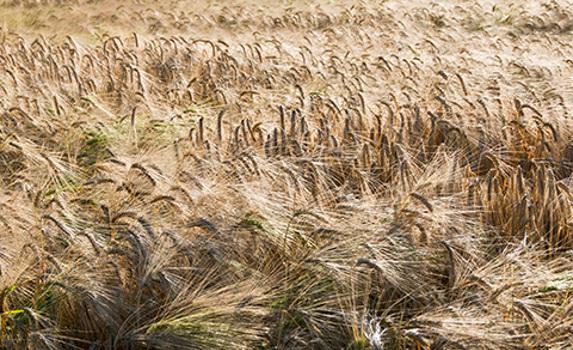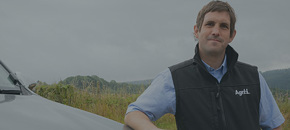
Better Timing Central to Cornish iFarm Sustainability Improvement
News - 12.11.21
Calabrese, potatoes and grain maize as the spring breaks in the wheat-based rotation at Trerule Farm, near Saltash on the south coast of Cornwall seriously limit the opportunities for a no-till approach. But this hasn’t prevented W.H Bond & Sons making substantial improvements to the health and resilience of their soils over the past five years, in particular.
With strategic agronomy support from Agrii’s Michael Dray, farm manager, Will Doidge and his team have focused their efforts on a number of management changes based firmly on better timing to build greater sustainability into their 730ha business.
These have included dropping both winter barley and OSR from the rotation; upping the proportion of spring cropping; bringing wheat drilling forward to late September; chopping all cereal straw; switching from main crop to salad potatoes; and harvesting grain maize in October rather than November.
Wheat for local feed markets is now grown every two or three years between breaks of winter oats and the spring crops. In addition to the rotational and timing changes, some 2000 tonnes of broiler manure are incorporated each year. And a crop of Italian ryegrass for silaging by a neighbouring dairy farm is grown between the wheat and the calabrese.
“Our Horsch Pronto gives us the flexibility to establish our winter crops with as little tillage as possible,” explains Mr Doidge. “We have tried strip-tilling in some of calabrese we grow in partnership with Southern England Farms for the first time this season. But our potatoes always need deep tillage, and incorporating muck ahead of our grain maize also limits our tillage reduction options.
“Even so, we have been able to build organic matters on our shallow silty clay loam soils to 6%-plus and noticeably improve their structural stability. This is paying dividends in increasing our resilience to an annual rainfall which averages 1200-1400mm and seems to be occurring in ever fewer and more intense events.
“Incorporating all our straw for five years now has definitely helped here, improving the ground’s ability to both absorb and retain moisture and reducing its vulnerability to capping,” he points out.
“Yes, this does mean foregoing a good local market. Alongside the organic manuring, however, it cuts our purchased P&K bill. Even more importantly, it eliminates delays from contractors baling and buyers picking-up straw that almost always gets rained-on, not to mention reducing trafficking. This means nothing gets in the way of our own operations, so we can stay ahead with our winter sowing rather than having to play catch-up and suffer the consequences.
“If we didn’t chop our wheat straw we couldn’t grow a crop of Italian ryegrass ahead of the calabrese to give us valuable winter cover and extra income, for instance. Nor could we reliably drill wheat in September following winter oats.
“Pulling our wheat drilling a good two weeks forward from the traditional second week in October has really helped us give it the best start and cut the risk to our soils. Having lost Deter, it does mean we have to keep on top of aphids with the sprayer, though. And, of course, our Septoria control needs to be spot-on.
“Other than a small amount of black-grass (brought in by a baler in the past!) which we’ve stamped down on hard, we don’t have serious problems from the weed. Instead, our grassweed control focus is very much on ryegrass and bromes which can be managed effectively in our spring crops. This means we can take advantage of our most favourable wheat sowing slot.”
A three-way split of Graham, Costello and KWS Extase continues to be the preferred wheat mix at Trerule Farm, with specific weight as important as Septoria resistance in variety choice to safeguard returns.

Winter Wheat
Winter WheatSwitching from main crop to salad potatoes so the ground can be cleared in July and August rather than October has been as valuable as straw chopping in allowing an earlier start to wheat sowing. This has been particularly useful in reducing the pressure on soils vulnerable to damage under the high rainfall conditions.
Grain maize planting in late March (under biodegradable film) has proved equally valuable here. Despite the cold April, this year’s crop came through the ground in just five days to take maximum advantage of the month’s high level of solar radiation. What’s more, it was ripe enough to harvest in early October, giving a decent entry for the latest sown wheat.
“We moved from growing crimped to grain maize several years ago and find it can give us a similar return to wheat at 8.0-8.5t/ha for a similar total cost,” Mr Doidge explains. “Having increased the area to around 80ha, we have enough volume to attract local feed mills.
“We have learnt not to try slotting in an extra forage crop ahead of the maize like we do with the calabrese, though. It’s far better to make sure the muck is well incorporated and the ground in the right condition before planting. And the opportunity we lose at one end of the season by getting the maize in early is more than made-up for at the other in decent yields at the earliest possible harvest; which gives us just what we want for both our wheat and our soils.”
Flexible crop rotations:
Securing a more consistent return from each crop and for the rotation as a whole is central to the Trerule Farm team’s sustainability improvement efforts. Which is why winter barley and OSR are no longer part of the rotation.
Considered to be ‘just about OK’ in their rewards, Mascani winter oats for milling have a considerably lower input requirement than the wheat and are relatively easy to combine. Their main value, however, is as a wheat break that gives a good organic matter return to the soil in straw and doesn’t put additional pressure on already busy spring workloads.
“Like the wheat, not growing too much straw is an important objective in our agronomy,” notes Michael Dray. “As well as minimising any incorporation problems, our robust PGR approach ensures crops that stand well for the most reliable combining. This is crucial with the wet summers we get down here.
“Crucial too is keeping on top of Septoria tritici. Our local climate means we invariably come into the spring with plenty of disease in the canopy. So, even if an early dry spell holds it back, we know it will explode as soon as the rain comes if we are not spot-on with our spray timings.
“This past summer has been the most challenging we’ve ever had for the disease. The weather meant we were a week later than planned with our T2s and we really suffered from no longer being able to use chlorothalonil at T0 and T1. To such extent that, although a step up from what we’ve had in the past, even Revysol couldn’t do the job we hoped it would. This led some very promising crops in May to be disappointing at harvest.
“The newer chemistry coming along did a much better job visually in the south west iFarm trials Trerule Farm hosts,” he reports. “So, it will be interesting to see just how much benefit it gave us when all the data is crunched. In any event, this year has taught us we have to be even more religious with our timings as well as fungicide choice to deal with the sort of weather variability we’re getting these days.”
The experience of this season also led the team to think about pushing their 2021/22 variety mix more towards KWS Extase. While it has always stood out for its disease resistance in their trials, the fact that it comes with a significant yield penalty over the likes of Graham in their situation persuaded them out of any kneejerk reaction.
“Based on results from our previous seasons’ variety trial work, we decided to maintain the same variety balance rather than risk over-reacting to a single exceptional Septoria year,” Mr Doidge insists. “Our Agrii iFarm work means we can base our decisions on the most local R&D we can get – on our own soils managed in the way we do under our particular conditions. This is invaluable.
“With our early drilling and the loss of Deter, we are especially interested in the performance of BYDY-resistant wheats as the trait comes through in varieties with better Septoria resistance than RGT Wolverine. Seeing exactly how the emerging new fungicide chemistry is working here in the absence of chlorothalonil before it arrives on the market is equally valuable in our decision-making and will become increasingly so.
“We are also finding digital tools like Agrii’s BYDV Alert app useful in targeting our treatments increasingly more precisely. Improved micro-nutrition is another area we are working on to bolster the health and resilience of our crops. While we have been dabbling with and want to believe in them, sadly we have yet to find a bio-stimulant consistent enough to rely on, though.
“Alongside the combinations of variety, chemistry and nutrition we find work best here, we are looking to the progress we’re making in soil health and cropping resilience to give us the edge in managing the increasingly unpredictable climate,” concludes Mr Doidge.
“Having our own weather station is very useful too. Knowing that our annual rainfall is fairly consistent, for instance, means the amount of rain we’ve already had at any stage in the season gives us a good indicator of how much more there is to come. Perhaps, this could be a good way forward for a weather risk prediction model?”
Join Our Community

Agrii X
We love engaging with clients and partners. Give us a follow and let's share stories for the community.

Agrii Instagram
A picture paints a thousand words. Follow us on Instagram to see what we are up to.

Agrii Facebook
Follow us on the worlds biggest social media site for the latest news and events straight to your feed.

Agrii LinkedIn
If you are all about the business, connect with us on LinkedIn to build your network
Stay In Touch

Newsletter Sign-Up
Receive email updates on topical news and information from around Agrii and UK Farming.

Listen To Our Podcasts
Listen to the Tramlines Podcast. Fortnightly chat about agriculture and trials with your host Tony Smith.

Agrii Insights
Read essential agri intelligence for profitable farming.

Find an Event
Join us for our upcoming events and tours.



